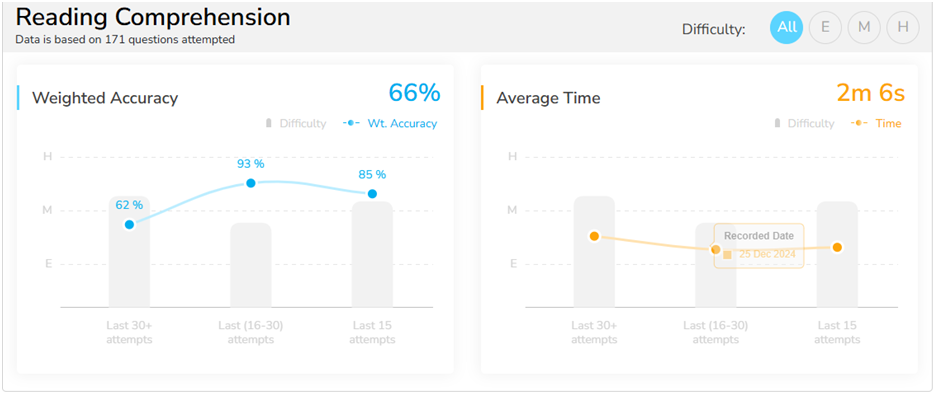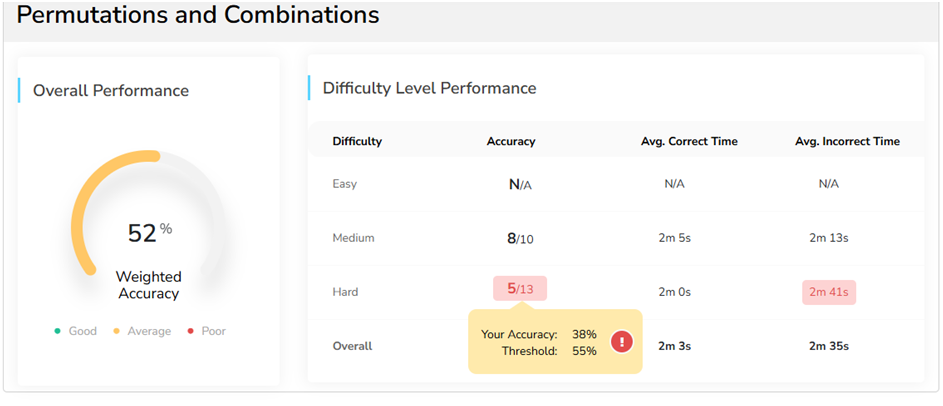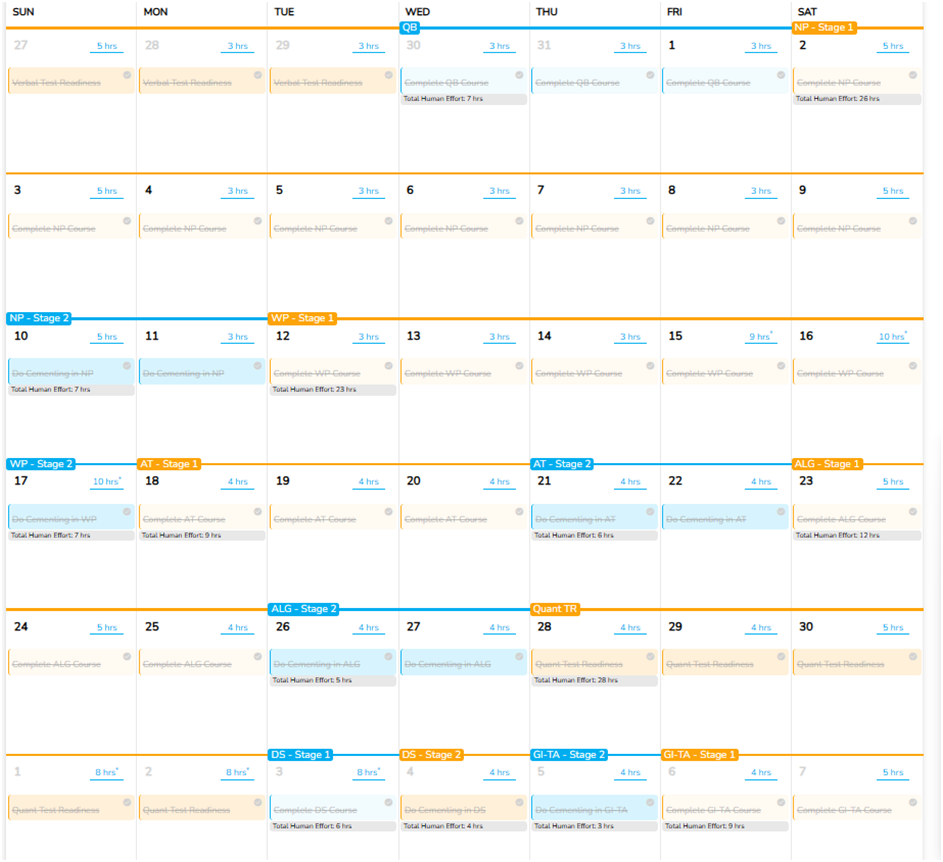Events & Promotions
|
|

GMAT Club Daily Prep
Thank you for using the timer - this advanced tool can estimate your performance and suggest more practice questions. We have subscribed you to Daily Prep Questions via email.
Customized
for You
Track
Your Progress
Practice
Pays
Not interested in getting valuable practice questions and articles delivered to your email? No problem, unsubscribe here.
- Nov 18
11:00 AM PST
-12:00 PM PST
Join us in a live GMAT practice session and solve 30 challenging GMAT questions with other test takers in timed conditions, covering GMAT Quant, Data Sufficiency, Data Insights, Reading Comprehension, and Critical Reasoning questions. - Nov 22
11:00 AM IST
-01:00 PM IST
Do RC/MSR passages scare you? e-GMAT is conducting a masterclass to help you learn – Learn effective reading strategies Tackle difficult RC & MSR with confidence Excel in timed test environment - Nov 23
11:00 AM IST
-01:00 PM IST
Attend this free GMAT Algebra Webinar and learn how to master the most challenging Inequalities and Absolute Value problems with ease. - Nov 25
10:00 AM EST
-11:00 AM EST
Prefer video-based learning? The Target Test Prep OnDemand course is a one-of-a-kind video masterclass featuring 400 hours of lecture-style teaching by Scott Woodbury-Stewart, founder of Target Test Prep and one of the most accomplished GMAT instructors.
Kudos
Bookmarks
Hello GMAT Club community! I'm excited to share my GMAT journey with all of you. I recently scored a 705 on the GMAT Focus Edition (Q84, V84, DI87), but what makes this achievement special is where I started – a 555 on my initial diagnostic test. I hope my experience can inspire and help those who are currently on their GMAT journey.
Background and Initial Assessment
My GMAT journey began with a mock score of 590 on the Classic GMAT, which translated to approximately 555 on the Focus Edition. My initial section scores were Q49 (approximately 75th percentile) and V22 (approximately 20-30th percentile). While my Quant was relatively strong, I knew my Verbal needed significant improvement.
After this initial assessment, I realized I needed a more structured approach to my preparation, especially for Verbal. A family member recommended e-GMAT to me, and I decided to enroll in their program.
Data Insights: My Unexpected Strength (DI87)
Data Insights ended up being the standout section in my actual GMAT, scoring a DI87 which significantly contributed to my overall 705 score. Here's how I approached this section:
Initial Challenges
Time Management Strategy
Initially, I made the mistake of blindly skipping certain question types like TPA Verbal because I thought they were too time-consuming. Over time, I learned a more effective approach:
As I practiced, my timing improved from around 3 minutes per question to about 2:30, which made a significant difference in the overall section.
Quality and Variety of Practice
The variety of questions in my practice materials was crucial to my success:
Verbal: From 20th Percentile to V84 (90th+ Percentile)
Critical Reasoning Transformation
Before my structured preparation, I didn't have a systematic approach to CR questions. My major breakthrough came when I learned about:
The key insight was that pre-thinking doesn't mean you must predict the exact answer choices. Rather, it's about fully internalizing the argument so you can more efficiently evaluate the options presented.
Reading Comprehension Challenges
RC was actually more challenging for me than CR in terms of time management:
The most important lesson I learned was not to rush through the passage itself. Thorough understanding of the passage is critical, even if it takes time.
Quant: Refining an Existing Strength (Q84)
Despite starting with a relatively strong Quant score, I still worked to refine my approach:
Using Pace Engine Effectively
The Pace engine evaluated my skills and suggested I could skip about 60 hours of content. While I could have skipped those sections, I chose to watch all the concept videos, but at 2x speed when the material was familiar. This approach ensured I didn't miss small but potentially important details.
Test Day Experience
On test day, the Quant questions were significantly harder than I expected:
Despite these challenges, my thorough preparation helped me achieve a solid Q84.
Mock Test Journey: The Importance of Persistence
My mock test scores fluctuated considerably throughout my preparation:
The key insight I gained was that the journey is rarely linear. There will be ups and downs, and that's completely normal. What matters is:
I found that the Sigma-X mocks from e-GMAT were particularly representative of the actual test, especially in how they translated mistakes into scores.
Test Day Experience
On the actual test day:
Key Takeaways and Advice
For those currently preparing for the GMAT, I'd like to share these final thoughts:
1. Consistency is key: Show up every day, even when you don't feel like it
2. Trust the process: There will be days when you question whether you're on the right track - stick with it
3. Manage test anxiety: Stay calm during mocks and the actual test - panic significantly impacts performance
4. Time management: Develop strategies specific to each section, particularly for Data Insights
5. Quality over quantity: Understand why you're making mistakes rather than just solving more questions
6. Structured approach: Following a structured methodology is crucial, especially for weaker sections
Final Thoughts
The GMAT journey isn't just about the destination but also about the growth along the way. I learned as much about resilience and perseverance as I did about verbal reasoning and quantitative skills.
Remember that your GMAT journey is unique to you. There may be setbacks, but with consistent effort and the right strategies, you can achieve significant improvement. I went from 555 to 705, and you can achieve your target score too!
Best of luck to all those preparing for the GMAT! Feel free to ask questions, and I'll be happy to help.
Background and Initial Assessment
My GMAT journey began with a mock score of 590 on the Classic GMAT, which translated to approximately 555 on the Focus Edition. My initial section scores were Q49 (approximately 75th percentile) and V22 (approximately 20-30th percentile). While my Quant was relatively strong, I knew my Verbal needed significant improvement.
After this initial assessment, I realized I needed a more structured approach to my preparation, especially for Verbal. A family member recommended e-GMAT to me, and I decided to enroll in their program.
Data Insights: My Unexpected Strength (DI87)
Data Insights ended up being the standout section in my actual GMAT, scoring a DI87 which significantly contributed to my overall 705 score. Here's how I approached this section:
Initial Challenges
- Getting accustomed to the new question types (Graphical Interpretation, Table Analysis, Two-Part Analysis, Multi-Source Reasoning)
- Understanding how to effectively manage time across different question types
- Developing strategies for more complex question formats, particularly MSR
Time Management Strategy
Initially, I made the mistake of blindly skipping certain question types like TPA Verbal because I thought they were too time-consuming. Over time, I learned a more effective approach:
- Don't blindly skip questions based on type
- Quickly assess each question to determine if you can solve it within 2.5-3 minutes
- Only skip if the question truly seems too complex or time-consuming
- Focus on improving efficiency in subsequent questions after solving the first one
As I practiced, my timing improved from around 3 minutes per question to about 2:30, which made a significant difference in the overall section.
Quality and Variety of Practice
The variety of questions in my practice materials was crucial to my success:
- Two-Part Analysis (TPA): Both quantitative and verbal variations, including unique question types not found elsewhere
- Multi-Source Reasoning (MSR): Practiced with purely verbal MSRs, purely quantitative ones, and mixed MSRs
Verbal: From 20th Percentile to V84 (90th+ Percentile)
Critical Reasoning Transformation
Before my structured preparation, I didn't have a systematic approach to CR questions. My major breakthrough came when I learned about:
- Question types: Learning to identify different question types (Inference, Assumption, Strengthen, Weaken, Evaluate, etc.)
- Pre-thinking: Instead of jumping straight to answer choices, I learned to internalize the argument and predict possible answers
- Complete understanding: Focusing on truly understanding the prompt and question before attempting to eliminate answer choices
The key insight was that pre-thinking doesn't mean you must predict the exact answer choices. Rather, it's about fully internalizing the argument so you can more efficiently evaluate the options presented.
Reading Comprehension Challenges
RC was actually more challenging for me than CR in terms of time management:
- Initial approach: I would take 7+ minutes on the first question, then 1.5-2 minutes on each subsequent question
- Note-taking evolution: I started by taking extensive notes (full page) for each passage, then gradually reduced to just 10-15 words, and eventually took minimal or no notes
- Strategy change: Instead of trying to cut corners on reading the passage, I focused on improving my time on subsequent questions to under 1 minute each
The most important lesson I learned was not to rush through the passage itself. Thorough understanding of the passage is critical, even if it takes time.
Quant: Refining an Existing Strength (Q84)
Despite starting with a relatively strong Quant score, I still worked to refine my approach:
Using Pace Engine Effectively
The Pace engine evaluated my skills and suggested I could skip about 60 hours of content. While I could have skipped those sections, I chose to watch all the concept videos, but at 2x speed when the material was familiar. This approach ensured I didn't miss small but potentially important details.
Test Day Experience
On test day, the Quant questions were significantly harder than I expected:
- Questions were longer and more complex than practice materials
- Several questions took 3-4 minutes each
- Finding shortcuts was more difficult under test conditions
Despite these challenges, my thorough preparation helped me achieve a solid Q84.
Mock Test Journey: The Importance of Persistence
My mock test scores fluctuated considerably throughout my preparation:
- First significant score: 695 (very encouraging)
- Subsequent scores: Some dips to 655 (discouraging but part of the journey)
- Final mock: 705 (exactly what I scored on the actual test)
The key insight I gained was that the journey is rarely linear. There will be ups and downs, and that's completely normal. What matters is:
- Sticking to the process even when scores fluctuate
- Not panicking when you have a bad mock test
- Using each mock as a learning opportunity
I found that the Sigma-X mocks from e-GMAT were particularly representative of the actual test, especially in how they translated mistakes into scores.
Test Day Experience
On the actual test day:
- The Quant section felt extremely difficult - harder than any practice material I had encountered
- After a brief break, I focused on maximizing my performance in Verbal and DI
- To my surprise, the DI section felt easier toward the end, which likely contributed to my high DI87 score
- I finished with a 705, exceeding my expectations given how difficult the test felt
Key Takeaways and Advice
For those currently preparing for the GMAT, I'd like to share these final thoughts:
1. Consistency is key: Show up every day, even when you don't feel like it
2. Trust the process: There will be days when you question whether you're on the right track - stick with it
3. Manage test anxiety: Stay calm during mocks and the actual test - panic significantly impacts performance
4. Time management: Develop strategies specific to each section, particularly for Data Insights
5. Quality over quantity: Understand why you're making mistakes rather than just solving more questions
6. Structured approach: Following a structured methodology is crucial, especially for weaker sections
Final Thoughts
The GMAT journey isn't just about the destination but also about the growth along the way. I learned as much about resilience and perseverance as I did about verbal reasoning and quantitative skills.
Remember that your GMAT journey is unique to you. There may be setbacks, but with consistent effort and the right strategies, you can achieve significant improvement. I went from 555 to 705, and you can achieve your target score too!
Best of luck to all those preparing for the GMAT! Feel free to ask questions, and I'll be happy to help.
Attachments
Thannuh 4.png [ 58.08 KiB | Viewed 838 times ]
Thannuh 3.png [ 38.73 KiB | Viewed 840 times ]
Thannuh 2.png [ 38.92 KiB | Viewed 839 times ]
Thannuh 1.png [ 33.5 KiB | Viewed 840 times ]
Kudos
Bookmarks
Hi Puneet11, do you have advice on how to improve from D79 to D82? Appreciate your help! 
Thank you!

GMAT-Club-Forum-0x35tun4.png [ 77.3 KiB | Viewed 794 times ]

GMAT-Club-Forum-53x0gt6i.png [ 86.62 KiB | Viewed 794 times ]

GMAT-Club-Forum-dnvzqddr.png [ 233.39 KiB | Viewed 800 times ]
Thank you!
Puneet11
Attachment:
GMAT-Club-Forum-0x35tun4.png [ 77.3 KiB | Viewed 794 times ]
Attachment:
GMAT-Club-Forum-53x0gt6i.png [ 86.62 KiB | Viewed 794 times ]
Attachment:
GMAT-Club-Forum-dnvzqddr.png [ 233.39 KiB | Viewed 800 times ]
Kudos
Bookmarks
Hi miag (Sorry did not get your name)
Will be my pleasure if I can be of any help.
D79 to D82 - I did following things which helped me
1. GI - Make a record of various graphs which can be asked and practice the same - use OG material and your preferred course material which you have subscribed. This will help in improving your speed and accuracy
2. MSR - If it has 3 pages, try to take notes of one of the pages, preferable the page for which you need to take minimum notes. If it has excess data - It's a data overload and trap - just skim and mov to the question to understand which data is important.
3. DS - We get 7-8 DS questions. it can help you in improving your score. Practice all questions given in OG. Remember if you get option C very easily, it may be a trap.
4. Sooner or later you will get a question which you will not be able to answer correctly. Identify such a question smartly and move on to the next. For this identify your weak question type and if you get stuck in such a question in main exam, don't waste much time and move on. This will come with practice.
5. Understand the marking pattern - If you answer one wrong, penalty is not much, but if you answer two questions wrong consecutively, heavy penalty is imposed.
If you have any other specific please feel free to ask
All the best dear
Will be my pleasure if I can be of any help.
D79 to D82 - I did following things which helped me
1. GI - Make a record of various graphs which can be asked and practice the same - use OG material and your preferred course material which you have subscribed. This will help in improving your speed and accuracy
2. MSR - If it has 3 pages, try to take notes of one of the pages, preferable the page for which you need to take minimum notes. If it has excess data - It's a data overload and trap - just skim and mov to the question to understand which data is important.
3. DS - We get 7-8 DS questions. it can help you in improving your score. Practice all questions given in OG. Remember if you get option C very easily, it may be a trap.
4. Sooner or later you will get a question which you will not be able to answer correctly. Identify such a question smartly and move on to the next. For this identify your weak question type and if you get stuck in such a question in main exam, don't waste much time and move on. This will come with practice.
5. Understand the marking pattern - If you answer one wrong, penalty is not much, but if you answer two questions wrong consecutively, heavy penalty is imposed.
If you have any other specific please feel free to ask
All the best dear
miag


















